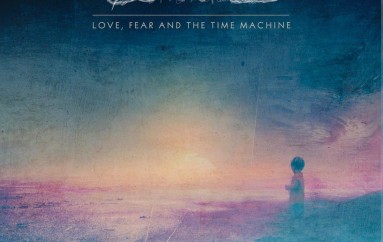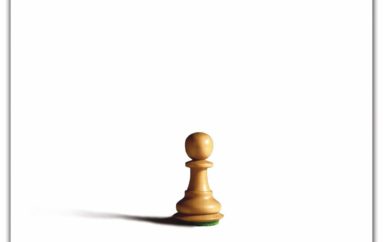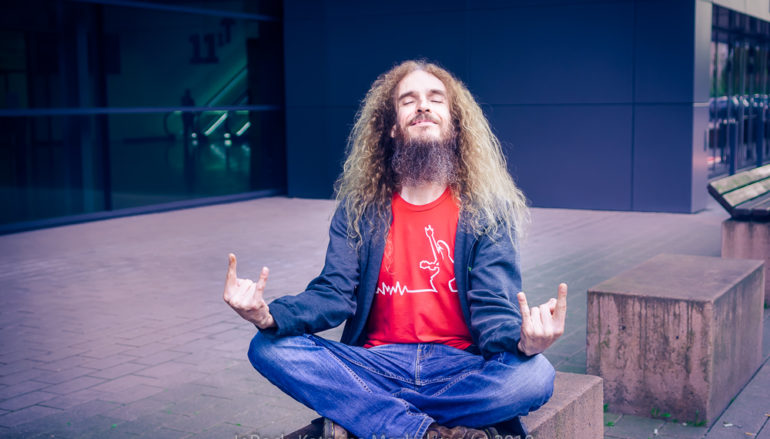
Guthrie Govan (The Aristocrats): Universal language
We know Guthrie Govan as a guitar hero and virtuoso, who continues to amaze both music fans and experienced guitar players. He first started to get attention of rock fans in the band Asia and GPS, project of ex-Asia singer John Payne. Later on he formed fusion-trio The Aristocrats, played and recorded with Steven Wilson, guested on recent Ayreon album. For those who ever held the guitar in hands, he’s a half-god, no less.
Govan travels a lot, plays around the world and get him for a thorough talk is not an easy task. The perfect place to do it was at Frankfurt MusikMesse Expo. We got him! Out of noisy guitar pavilion, we sat at the table of abandoned cafe, immediately cut off from a storming sea of music.
 Let’s start with what are you up to now?
Let’s start with what are you up to now?
I’ve had a crazy couple of years, I’ve spent a lot of time playing with Hans Zimmer, a movie composer (who made music for «Pirates of the Caribbean» «Gladiator,» «The Dark Knight» trilogy, «Inception,» «Interstellar,» & many more – K.M.). He had this big band with about 20 rock style musicians at the front and with an orchestra behind, so there are 70 people on stage. We’ve been touring like maniacs. Hearing that kind of music every day had an effect on the way how I think about music. So the music I’m hearing in my head now is all quite orchestrated and complex, not a power-trio type of music. So now I’m trying to work out how to capture some of these new influences in the next music I make. It’s also an interesting time, because for the last 5-6 year, I made music, toured and recorded with a band called The Aristocrats. I love that trio!
…I love that trio too, you know!
Oh, thank you! We are all the same, it feels like we went to school together, even though we had a german drummer (Marco Minnemann), US bass player (Bryan Beller). We are the same age, we’ve listened to the same stuff when we were kids, so everything just connects when we play together! But right now Joe Satriani have borrowed the bass player (for G3 tour – K.M.), so we had to press the pause button on touring activities to start again in September this year [2018], when we’ll have our European tour. I think then we will all talk about what to do next!
(By the recent information, new The Aristocrats album is almost finished, it’s titled «You Know What…?” and scheduled to be released right before the American tour which starts in June.)
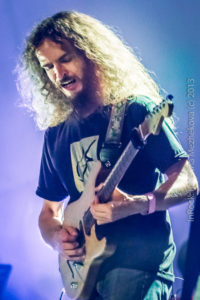 Good! I was lucky to see you playing with Steven Wilson, 4 years ago at Bospop Music Festival in The Netherlands. How was it for you and what experience did you get from playing with Steven?
Good! I was lucky to see you playing with Steven Wilson, 4 years ago at Bospop Music Festival in The Netherlands. How was it for you and what experience did you get from playing with Steven?
It was cool! I like to have a balance: sometimes I want to be a solo artist and play my music, and sometimes it’s good to take whatever I know about guitar and use it to help someone else to realize their vision. So it was really interesting to play with him at that time of the “Raven…[That Refused To Sing”] album. Musically, I think that was when I had the most to offer! The “Raven…” album to me was a 70s prog-album, but with jazz-fusion musicians: there was always room for improvisation, the songs were played a little differently every night. I really liked that land of influences, I felt like I belonged to it. Now I don’t think it would be right for me, because Steven is in the different phase. I think for what he is doing now, he doesn’t need someone who does that kind of thing that I do, because he has moved more into the pop direction.That’s the cool thing about Steven: he keeps changing and reinventing himself. So I’m really glad I played with that band at that moment when it felt right!
Changes are good in that way! I guess one of the worst thing in music is to be stuck to just one set of old hits and miss the opportunities to evolve. You have to be diverse nowadays!
I totally agree!
So you are not in the composing stage, aren’t you?
Not yet, no. I filled up my calendar with lots of little things and I’ve been traveling so much lately. My diary doesn’t have much structure at the moment, it’s just that I’m trying to squeeze in little things here and there. Well, it’s good for my brain, because I have to become a different guitar player every week or two, to adapt to different surroundings and I enjoy that! But in terms of writing a new solo album and stuff like that, I need to hide in my cave and stop saying “yes” to work. So there are lots of ideas swimming in my head and none of them are fully formed yet.
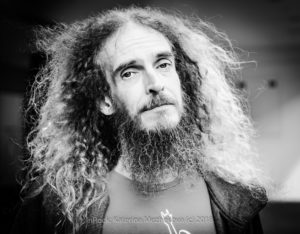 So we’ll be waiting! As touring so much can be draining, what brings you energy and lights the fire in you?
So we’ll be waiting! As touring so much can be draining, what brings you energy and lights the fire in you?
Yes, extensive touring can be draining: it is not good for your health and sleeping patterns, you can’t always eat the things you want to eat. The thing that sustains while on tour is just playing music with people and for people. Isn’t that why we’ve invented the music as a kind of social activity and as an exchange of energy?! That keeps you sane and keeps you alive, makes you feel that you survive till the end of the tour. Also the whole major touring is your travelling. Every day you wake up in a new place. Often they speak a different language, listen to the different music on the radio and so on. Everything that happens in your life counts as an influence on you and it molds who you are, it changes how you see the world!.Well, I don’t complain for the touring life, ‘cause it’s the life I chose and I chose it for a good reason, it suits me. If I did anything else, I would not be happy, I wouldn’t feel complete as a human bring. So I have a good feeling that I’m doing what I should be doing.
…And it makes you treasure the moment! But if you imagine yourself doing something else, what would it be?!
When I was 20 years old I was at Oxford University, reading English Literature. As I was a very academic kid, certain things came very naturally to me. So it was around that age that I Had to make a choice: do I want a have my degree at this really good University and then what? Become an English teacher? Or do I care for the life of rock-n-roll? So I obviously chose that. But to me, music and language are basically the same thing. So if by some horrible reason, I couldn’t play anymore, I guess I would do something connected with the English Language, may be as a writer or something like that.
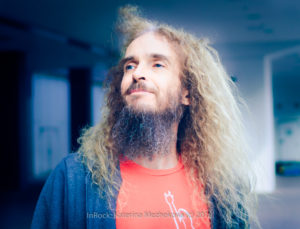 Does your academic experience help you while you are teaching guitar?
Does your academic experience help you while you are teaching guitar?
Kind of… I’m such a paradox at those things. I’m pretty schooled in terms of those academic subjects, but as a musician, I’m totally self-taught! So if I do a lot of clinics and workshops, the approach I take is talk about how could you teach yourself, because it’s all I really know! I know how you suppose to learn, as a method, so I can tell what comes out if you apply those principles to teaching yourself.
That’s very important, as the overload of information can be very confusing for someone starting to learn guitar all by himself. Academic studies give your knowledge a system, which is a great relief.
Yeah, and look, those people doing that degree in English Literature with me, even if they don’t work as English teachers now, that degree actually shows that they can concentrate on something, they can explore on idea fully! If you can do that with one idea, you can apply the same skill to something else you prefer.
Did your parents support you?
Yeah! There were disappointed people in my family when I left arguably the best University in the country. Well, I had a great time there, I loved it, I met remarkable people in that beautiful city, but I was reading fewer books that I’ve read before I went there, because somewhere deep down in my brain, I don’t like being told to read books. I don’t like having to dissect books and write an essay on why it works. The obligatory thing to write an essay on why do you like that person or why that chicken tastes good, etc, takes all the fun out of it! Sometimes you just know and that’s all you need!….Hey, where are the questions about strings and picks?! It is for a rock magazine, your readers would be confused by those answers, hahaha (laughing)
 Hahaha, I’m not of that kind to ask such questions, I’m always more interested in creating a portrait of a person, not bugging people for wikipedia details, we have Google for it.
Hahaha, I’m not of that kind to ask such questions, I’m always more interested in creating a portrait of a person, not bugging people for wikipedia details, we have Google for it.
That’s cool, I’m having fun, thank you!
The pleasure is all mine! So, going back to books, do you have time to read nowadays?
Sometimes I do have time for that, but not always. Something happened when I found the Internet. To me the internet is not a notice board to tell the world what you are doing and show them a picture of your breakfast, to me, it’s a library! Whatever you want to know, you can find it in the internet. So I’m a passive user of the internet and I read there about whatever interests me. That is taking away some of my book reading time. You know, sometimes if I plan to go to a country, I like to read a book that is from that country. Before my first visit to the US, I’ve been reading a lot of Hunter S. Thompson and Tom Robbins, and more modern writers like that. I guess that somehow helped to prepare me for what to look for in that new country. The last Russian book I’ve read was “Hard To Be A God” by Strugatsky brothers. That was quite controversial. I can read a book and then read about some political background and the history around it.
In terms of fulfilling your energy after the gigs, what helps you? Like walking, sports, meditation, etc?
Well. I have to walk a lot, because I still don’t have a driving license, haha… I walk whenever I can. Sometimes it’s nice to do just absolutely nothing! I don’t meditate in a practiced way, but quite often you feel that it does you good just to be on your own, just doing something quiet and not thinking about anything. There are times when it doesn’t work… Beer to the rescue (raises a bottle of beer, laughing)... I enjoy certain movies, comedy fascinates me. I feel that stand-up comedians have a lot in common with musicians. In particular, when you are doing clinics: you are travelling from one place to another on your own, then you go on stage with your guitar and there are people staring at you, looking what can you do make them relate to you.That’s always interesting to know how people observe what is around them. People like George Carlin or Bill Hicks, those great cynical stand-up comedians. I love The Simpsons. It’s all another way of communicating, another way of thinking!
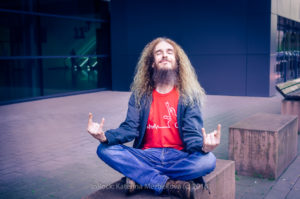 Another hobby I have, if you can ever call that a hobby, is electronic music. You see, I can never completely get away from music, but I can get away from the guitar. I really love less dance-orientated and more sophisticated things in electronic music, like: Luke Vibert, Squarepusher, Aphex Twin and artists like that. So sometimes when I’m trapped in my tour bus with a laptop, I just put the headphones on and invent an instrument just chopping up little pieces of sound, trying to make weird music. I really like that suddenly there are no rules! There is no one to say that you can’t make that sound, because your instrument doesn’t have that note..
Another hobby I have, if you can ever call that a hobby, is electronic music. You see, I can never completely get away from music, but I can get away from the guitar. I really love less dance-orientated and more sophisticated things in electronic music, like: Luke Vibert, Squarepusher, Aphex Twin and artists like that. So sometimes when I’m trapped in my tour bus with a laptop, I just put the headphones on and invent an instrument just chopping up little pieces of sound, trying to make weird music. I really like that suddenly there are no rules! There is no one to say that you can’t make that sound, because your instrument doesn’t have that note..
Do you plan to combine your experiments with your guitar music?
Yeah, it’s one of my long-term plans to put them together and make some sort of electronic music with certain guitar parts in it.
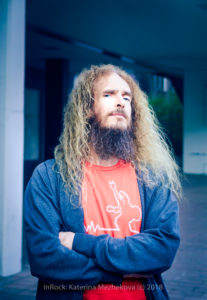 How do you develop your technique?
How do you develop your technique?
The key thing for me and the technique is that I started so young! Around 3, I don’t remember. So if someone asks me why did you start playing guitar, it is like asking me why did you learn to speak English. My Dad played a little bit, so there was an acoustic guitar in the living room, and I guess I saw him playing and that made an impact on me.So I thought: Oh, you can make music with this instrument so you don’t need a record player for your favourite music. In my 3 year old brain that was really a life-changing realisation. The thing is that when you are 3, you are fearless and you naturally find the easiest way to do something. Sometimes you end up with an efficient technique just because you are lazy and fun-loving. I’ve seen a lot of players with bad technique and there problem is that they’ve started when they were 14, particularly guys, when there is a lot of testosterone coursing in their veins. They think that guitar is a weapon to compete with other guys,so they feel they need to play stronger and faster and louder. It’s horrible when you see people like that and they end up with ferocious technique, you watch them play, and they are tense! It doesn’t look like they are enjoying it or expressing themselves either. But the baddest thing is that those later people give up! If they start when they are little kids, people generally don’t give up. But the other important thing is to care about the quality of the note and whether it actually sounds good. Some people just learn 3 chords and are satisfied with that. But I always had that aspect of my personality that wanted to find out how far you can push something: can I make it sound cleaner or more in time? I test myself asking: if someone else played that sound, would I pay to hear it? So with this in mind, I think it is important to play in a way that feels natural, the technique will just come. Everyone ends up with the technique they need and the technique they deserve!
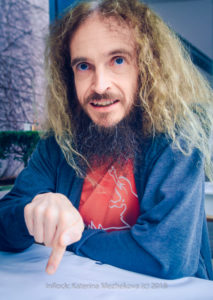 Well said! How can one actually feel what’s his/her true style and then how to nurture and develop it?
Well said! How can one actually feel what’s his/her true style and then how to nurture and develop it?
It’s a product of your diet! You know that people say: you are what you eat. I think you are what you listen to, as well! Your inspiration doesn’t fall from the sky, there is a stage when you absorb all the music you find and all the art you encounter, then slowly it becomes your vocabulary. Later, when you don’t expect, elements of those influences come out. So if you just listen to the same thing all the time, what’s gonna come out? Only that thing, but slightly worse and less sincere. So you have to listen to a lot of different things and follow whatever fascinates you, but do not overanalyze it! Like this your own musical voice would be more varied and more surprising! It will still be a product of all you’ve been listening to, but all that way you have been making decisions and it was your choice of aspects you decide take with you, so as the result anyway you will tell your own personal story, even though it would be based on something that preceded you. It is exactly the same as learning to talk: we can express ideas, we can tell how we feel, but we learn by listening to other people and copying them, you just don’t listen to one person all the time.
 With music as a language and the guitar as its voice, what difference does it make to create instrumental music and music with vocal parts in it?
With music as a language and the guitar as its voice, what difference does it make to create instrumental music and music with vocal parts in it?
Some of my favourite music with vocals would be artists like Bjork, and when you listen to her, you understand that she is using her voice as an instrument. She is not broadcasting lyrics, she can switch from English to Icelandic and I won’t notice that, because I’m listening to her voice as music and enjoying the sound of each syllable. I guess I’m a funny person to ask that question, even though I had all that literature background, if I want something with words, I would read a poem. And if I wanna know about politics, I won’t listen to U2 album. The great thing about music is that it’s universal. For me instrumental music is more applicable for any listener anywhere in the world…
… and it tells a personal story to everyone..
Yeah, I mean, maybe I’m just lucky, I grew up learning one of the most dominant language in the world, the language you can speak and be understood almost everywhere. But even if I play in Vietnam, for example, and I did that, and people there don’t understand a word of what I’m saying, but I go on stage and I feel they are instantly connected to what I’m playing. That’s how music works: music is a universal language!
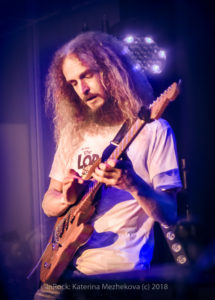 That’s magnificent! Having that in mind, do you find classical music inspirational?
That’s magnificent! Having that in mind, do you find classical music inspirational?
Yeah, I mean, not directly, but I love a lot of classical music. I think we should listen to everything that is available, why cut yourself off from anything!?! Phase 1 of the growth for each guitarist is to stop listening just guitar music. Then stop listening to your favourite genre of music. There’s so much out there! Some of it is applicable to what you do. You’ve heard Yngwie Malmsteen playing neoclassical music, but it’s just 1% of what Bach, and composers like him, were doing. There are many aspects in their music, not just that, but Yngwie just took the bits he liked. Bach was a genius! I don’t even think that it’s easy for any casual listener to understand how complicated and amazing his music was.! Of course, he was writing at the time when there was so much emphasis on a counterpoint or things like that. May be people at that time were better at hearing that there were separate voices playing alongside each other. We’ve lost a lot of that hearing ability, and the things we listen to became more melodic…Oh. I love Debussy and Ravel, all the French impressionists. I love Stravinsky, I guess, anyone who likes metal would like Stravinsky, or they should.
Besides, there is another thing I like about classical music: when it opens its mind and listen to other styles of music, because it is quite rare.. Classical music usually seems quite pleased with itself, it just wants to preserve things the way they are. I love it when classical embraces something else: for example, what composers like Gershwin or Bernstein were doing in the US, embracing jazz. You know that was the music of oppressed African Americans and everybody was looking down on it, but Gershwin said: this is great if I can compose this with everything I know about harmony, or just take the sound and apply more sophisticated harmony. Same thing happened in Argentina with tango and composers like Piazzolla.
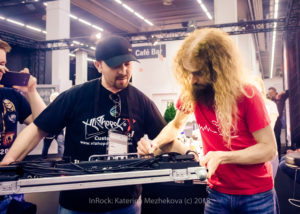 Haven’t you thought of releasing a record of classical works played in your style? You surely know some musicians do that..
Haven’t you thought of releasing a record of classical works played in your style? You surely know some musicians do that..
I don’t think I would like to do that. Sometimes people do that and it comes across as pompous. I’m always suspicious of a rock musician asking to be taken more seriously, because now they play classical music! I think that would never leave you afterwards. I like a more organic approach: when you are listening to that stuff a lot, certain details would jump out of you, and you will absorb it.
Sure! While you are teaching, what are the fundamental things you tell your students?
I can only talk about my goal as a musician. I think everyone takes an instrument for a slightly different reason. Someone just wants to be in a band, he learns 5 chords and goes happy, someone keeps looking for a perfect sound, for best team members, for a better way to make his listeners happy. I’ve had students who are doctors and lawyers who had much nicer equipment than I do, because they have a really good job, but they don’t spend much time with those instruments. So they are doing brain surgery all week and then they have 2 hours on Sunday to plug into the nicest amp in the world to play “Layla”, and that’s fine! Why not, that’s what music means in their lives. But for me, the point of playing an instrument is to imagine what I wanna hear and learn my fingers to make that sound as automatic as possible. It’s like when we speak, we are not deciding whether to use a verb or an adjective, it all just happens in the background. We are not aware of that, we just trust that it will happen. I want my music to feel like that, to flow from my fingers, so if there is anything I wanna hear, I wanna share it with the world just like this. So I talk a lot about how to make your guitar an extension of you and how to make your playing more like talking in your mother tongue.
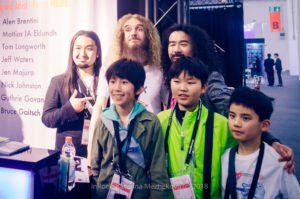 What experience did you get from playing with Hans Zimmer?
What experience did you get from playing with Hans Zimmer?
Oh, great! It’s the best gig ever! Besides the most interesting tourbus I’ve ever been on. After the gig you sit in the bus drinking beer with someone who plays violin in a classical orchestra and somebody who programmes analogue synthesisers for a living, and someone who plays gipsy jazz – everyone comes from a different musical country. Then we play iPod ping pong, when everyone plays a piece of music on his stereo. I’ll tell you one of my fondest memories. We had a very charismatic double bass player, about 60 years old. All she has ever done in her life is playing classical music, she knows everything about it. I think she heard may be one Beatles song, she didn’t know what Led Zeppelin was, she asked me one day: “What’s that “Steely Dan”? So ok, one night we said to her: “Come here, we want you to listen to this! “ – and we played Meshuggah on the stereo, and she understood it! She totally understood it! So there were lots of moments like this, we were sharing parts of our musical worlds, as we got to know each other’s personalities as we were part of the big band. That was great! I wish everyone could have a gig like that once in their life, it’s rare!
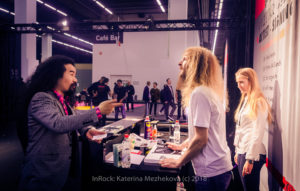 What do you think about writing music for the movies?
What do you think about writing music for the movies?
Oh, it’s a different skill. It’s not quite the same as I just wanna play what I hear in my head and tell you how I feel. Hans is amazing at it. This skill starts with the story, everything he writes is so intricately tied up with the plot. I don’t know if I could ever be that good at it. Sometimes Hollywood directors come to Hans and they give him a script saying : “we can’t make it work”. He tells them which character needs to be more developed and this scene needs to be before that one, and they listen to him. So here is the composer telling them how their film should work and this is the core of Hans’s approach to composing. It’s natural for him to write music that is a part of the film, rather than a separate thing. I’ve played on a couple of soundtracks since I got to meet Hans. I’ve been playing in “The Boss Baby”, an animated Dreamworks movie, that was fun. I recently played on something, there are some interesting noises I made there, but they’ll shoot me if I tell you, so I’m just teasing, hahaha!
Cool! What is your advice for a person who wants to start playing guitar nowadays?
Well, to make a living out of it? That’s hard, I’d say: that’s your world, you define it, you’ve created the Internet and now no one wants to buy music anymore. You are on your own in that world!
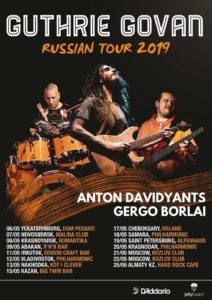 In terms of why someone should play, it’s gotta be fun! It has to feed part of your soul in some way! It’s not a sport, it’s not a normal job. If you try playing music and it feels good, then immediately you have to stop asking any questions about why you play, you just know it when it feels right, and go playing more. The thing I like to say sometimes is: music doesn’t owe you anything. If you put time and effort into mastering an instrument, that would give you a result. But if you have the frustration of not getting what you want, it’s not music’s fault. Music is created to make people happy! Even if there’s something dirty or deceased in your soul, I can’t think of a better way to get rid of that than through art. However horrible that bad thing was, you get it out and someone would hear the result and may be it would help them. It’s like an old Greek idea of catharsis, isn’t it? Make people sit through a really depressing story than in the end you feel purified and enriched. You feel better for having gone through that experience. Music is an outlet, music is energy!
In terms of why someone should play, it’s gotta be fun! It has to feed part of your soul in some way! It’s not a sport, it’s not a normal job. If you try playing music and it feels good, then immediately you have to stop asking any questions about why you play, you just know it when it feels right, and go playing more. The thing I like to say sometimes is: music doesn’t owe you anything. If you put time and effort into mastering an instrument, that would give you a result. But if you have the frustration of not getting what you want, it’s not music’s fault. Music is created to make people happy! Even if there’s something dirty or deceased in your soul, I can’t think of a better way to get rid of that than through art. However horrible that bad thing was, you get it out and someone would hear the result and may be it would help them. It’s like an old Greek idea of catharsis, isn’t it? Make people sit through a really depressing story than in the end you feel purified and enriched. You feel better for having gone through that experience. Music is an outlet, music is energy!
Text and photo — Katerina Mezhekova
April 2018, Frankfurt, MusikMesse.

